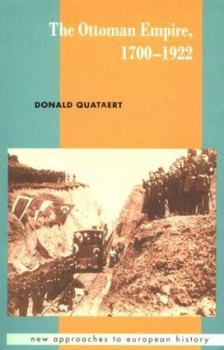The Ottoman Empire, 1700-1922
(Book #34 in the New Approaches to European History Series)
Select Format
Select Condition 
Book Overview
The Ottoman Empire was one of the most important non-Western states to survive from medieval to modern times, and played a vital role in European and global history. It continues to affect the peoples... This description may be from another edition of this product.
Format:Paperback
Language:English
ISBN:0521633605
ISBN13:9780521633604
Release Date:July 2000
Publisher:Cambridge University Press
Length:230 Pages
Weight:0.85 lbs.
Dimensions:0.6" x 6.0" x 9.0"
Customer Reviews
4 ratings
Well written, concise and clear
Published by Thriftbooks.com User , 15 years ago
Donald Quataert's _The Ottoman Empire_ is a wonderful history of the late Ottoman Empire. The opening chapters ("Why Study Ottoman History" was particularly incisive, and should be required reading for anyone interested in the Near East) give an outstanding summary and introduction in just over 30 pages. No mean feat, it is testament to Quataert's skill as a writer of history. The majority of the book, however, addresses the gradual implosion of the Ottoman Empire - the first half a broad overview of the policies and changes the Ottomans attempted to institute to slw its decline, the last half a closer look at the economic and social consequences and reactions to these polices. This organization works well. The internal and external forces tearing the Ottoman state apart: ethnic minorities seeking nationhood, an increasingly conservative ulaema advocating for a return to "Islamic values", a decaying economic infrastructure and the great industrial nations of Europe pulling and pushing in an attempt to maintain political and economic stability - are clearly shown with a few specific examples to illustrate the point without the historical minutae that can bog-down the non-expert. This is a well-written history that would be a marvelous companion piece to David Fromkin's A Peace to End All Peace: The Fall of the Ottoman Empire and the Creation of the Modern Middle East.
A good overview of the late Ottoman empire
Published by Thriftbooks.com User , 16 years ago
While I was grateful that this book did not follow a dry "date, place, event" format and in general was well written, I feel like I got less than I expected from it. I thought some of the earlier chapters were too brief, especially the chapter on the empire from 1683-1798. I also found several instances where topics were repeated (almost in their entirety) in two different chapters. For example the discussion of the Tulip Period and the influence of coffee houses and bathhouses both appeared twice, in about the same amount of detail. I thought the obvious repetition was unnecessary. Other parts of the book were quite good. The author's model of starting what other historians have said on both sides of the issue at hand, and then working to look at the issue not through other historians eyes, instead through a "first principles" approach, I thought was beneficial to my understanding and appreciation of the Ottomans and the time period. I also enjoyed the chapter on inter-communal relations as I thought that the author was very careful to imbue appropriate context (regional, economic, religious, etc.) and look at the state of relations between the three religions in a way that did not seem like he had an agenda, rather a quest for the true state of the empire's people at the time. I was interested to learn about the different interactions between groups in the Ottoman empire, as opposed to what I'd already learned about the interactions of those same groups in say, late Moorish Spain. To watch how a nominally declining state (considering that the Ottomans ceased to exist after WWI) adjusted its laws and policies was fascinating. I found this book at a used book store, and now having read it, was glad that I purchased it. This niche book is not for everyone, but there is a lot to learn about the state of the Ottoman empire during its last years (militarily, economically, socially) in it.
Good Introduction to Topic
Published by Thriftbooks.com User , 20 years ago
Quartert provides a broad sociological history of the modern Ottoman empire. For someone who knows very little about the Ottoman empire it provided a good flavor of the cultural and socio-economic make-up of the Ottomans. While the book is academic it is very well written, organized, and very assessable to the general reader.The one drawback to this monograph, and this is not a criticism given that this was not the intent of the book, I did not come away with a very clear picture of the political history of the empire. Of course generalizations about politics, how the state was run, and its relationships toward European powers are covered - but if you are looking for a detailed political history of the empire this not the book to pick up.Also, while there is a very short chapter on the legacy of the Ottoman empire at the end, it left me wanting much more. Especially since the Balkans and much of the modern day states that made up the Ottoman empire are today the flash point for ethnic and religious violence, from the former Yugoslavia, Israel, Palestine, Saudi Arabia, Yemen, and Iraq.
Great Introduction into the Ottoman History
Published by Thriftbooks.com User , 23 years ago
This book is one of the best if not the best as an introduction into the Ottoman history. Although the period Prof. Quataert focuses is from the 18th till the first quarter of the 20th century, the first three chapters are created as an introduction to the Ottoman Empire until 1700. Overall the book is very strong in historical analysis on an introductory level. At the end of each chapter Prof. Quataert offers a list of related readings, which makes this book a great resource for advanced students of Ottoman history as well.





